American History Essay: Global Exploration, Slave Trade, and Impact
VerifiedAdded on 2022/08/22
|5
|1205
|29
Essay
AI Summary
This essay provides a comprehensive analysis of the Atlantic slave trade, examining its origins in global exploration and the triangular trade system connecting Europe, Africa, and the Americas. It delves into the devastating impact of the slave trade on African societies, including the human experience of the Middle Passage and the loss of millions of Africans. Furthermore, the essay evaluates the profound effects of Atlantic World slavery on the society, culture, and economy of the Americas, highlighting the emergence of racial divides, social structures, and cultural identities. The work explores the lasting consequences of slavery, including its role in shaping the modern American landscape and the ongoing struggle for racial equality. The essay uses multiple sources to highlight the complexities and far-reaching implications of this historical period.
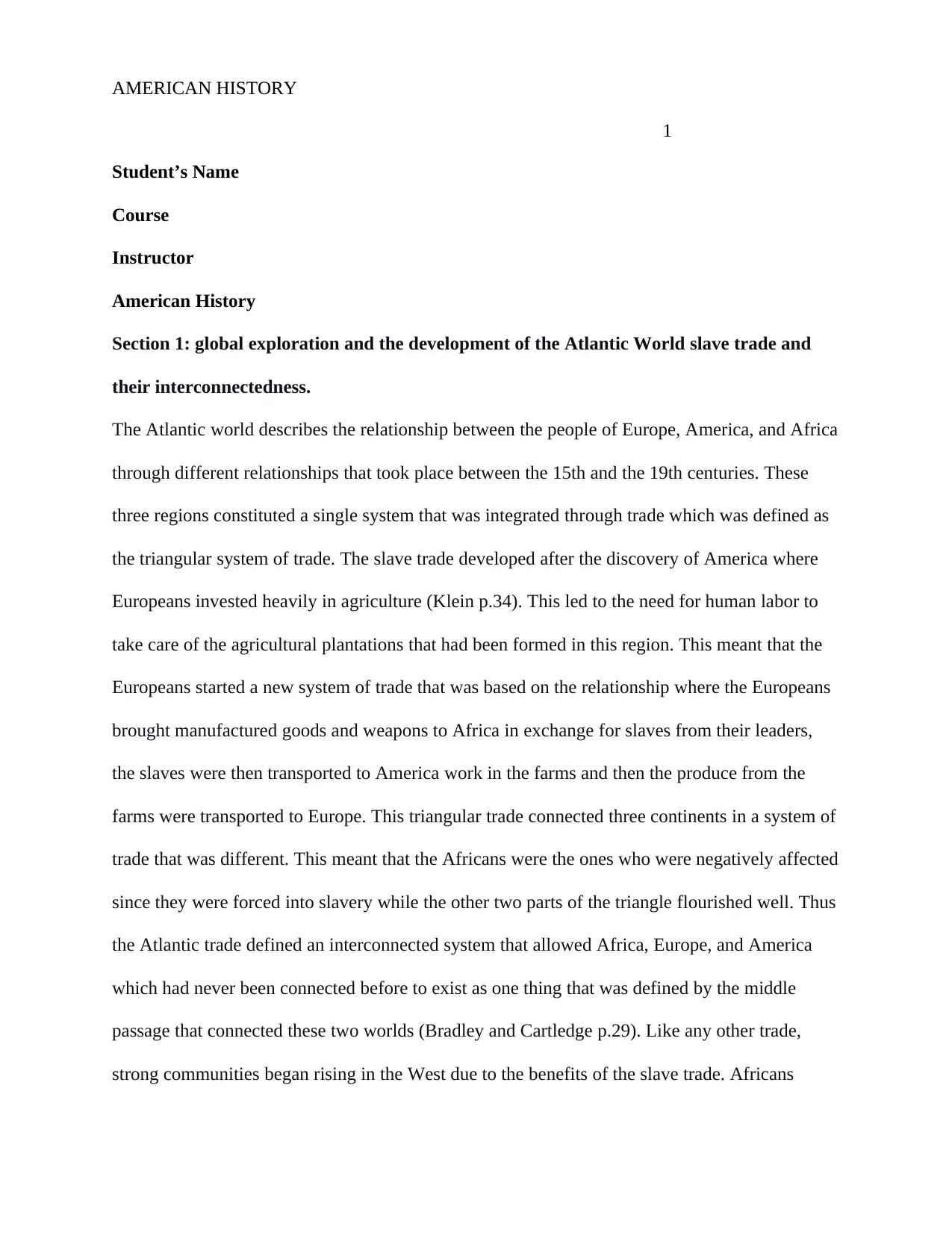
AMERICAN HISTORY
1
Student’s Name
Course
Instructor
American History
Section 1: global exploration and the development of the Atlantic World slave trade and
their interconnectedness.
The Atlantic world describes the relationship between the people of Europe, America, and Africa
through different relationships that took place between the 15th and the 19th centuries. These
three regions constituted a single system that was integrated through trade which was defined as
the triangular system of trade. The slave trade developed after the discovery of America where
Europeans invested heavily in agriculture (Klein p.34). This led to the need for human labor to
take care of the agricultural plantations that had been formed in this region. This meant that the
Europeans started a new system of trade that was based on the relationship where the Europeans
brought manufactured goods and weapons to Africa in exchange for slaves from their leaders,
the slaves were then transported to America work in the farms and then the produce from the
farms were transported to Europe. This triangular trade connected three continents in a system of
trade that was different. This meant that the Africans were the ones who were negatively affected
since they were forced into slavery while the other two parts of the triangle flourished well. Thus
the Atlantic trade defined an interconnected system that allowed Africa, Europe, and America
which had never been connected before to exist as one thing that was defined by the middle
passage that connected these two worlds (Bradley and Cartledge p.29). Like any other trade,
strong communities began rising in the West due to the benefits of the slave trade. Africans
1
Student’s Name
Course
Instructor
American History
Section 1: global exploration and the development of the Atlantic World slave trade and
their interconnectedness.
The Atlantic world describes the relationship between the people of Europe, America, and Africa
through different relationships that took place between the 15th and the 19th centuries. These
three regions constituted a single system that was integrated through trade which was defined as
the triangular system of trade. The slave trade developed after the discovery of America where
Europeans invested heavily in agriculture (Klein p.34). This led to the need for human labor to
take care of the agricultural plantations that had been formed in this region. This meant that the
Europeans started a new system of trade that was based on the relationship where the Europeans
brought manufactured goods and weapons to Africa in exchange for slaves from their leaders,
the slaves were then transported to America work in the farms and then the produce from the
farms were transported to Europe. This triangular trade connected three continents in a system of
trade that was different. This meant that the Africans were the ones who were negatively affected
since they were forced into slavery while the other two parts of the triangle flourished well. Thus
the Atlantic trade defined an interconnected system that allowed Africa, Europe, and America
which had never been connected before to exist as one thing that was defined by the middle
passage that connected these two worlds (Bradley and Cartledge p.29). Like any other trade,
strong communities began rising in the West due to the benefits of the slave trade. Africans
Paraphrase This Document
Need a fresh take? Get an instant paraphrase of this document with our AI Paraphraser
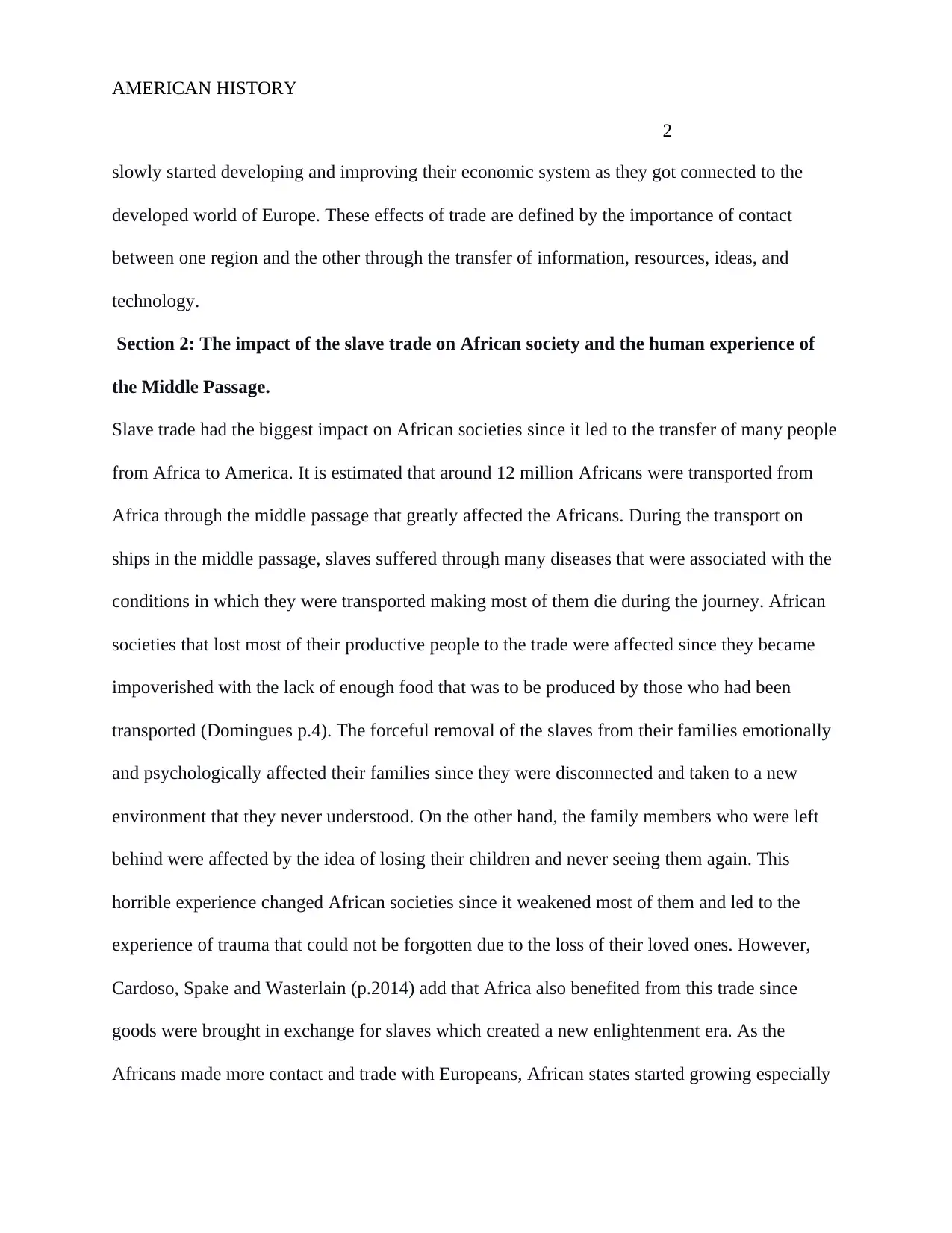
AMERICAN HISTORY
2
slowly started developing and improving their economic system as they got connected to the
developed world of Europe. These effects of trade are defined by the importance of contact
between one region and the other through the transfer of information, resources, ideas, and
technology.
Section 2: The impact of the slave trade on African society and the human experience of
the Middle Passage.
Slave trade had the biggest impact on African societies since it led to the transfer of many people
from Africa to America. It is estimated that around 12 million Africans were transported from
Africa through the middle passage that greatly affected the Africans. During the transport on
ships in the middle passage, slaves suffered through many diseases that were associated with the
conditions in which they were transported making most of them die during the journey. African
societies that lost most of their productive people to the trade were affected since they became
impoverished with the lack of enough food that was to be produced by those who had been
transported (Domingues p.4). The forceful removal of the slaves from their families emotionally
and psychologically affected their families since they were disconnected and taken to a new
environment that they never understood. On the other hand, the family members who were left
behind were affected by the idea of losing their children and never seeing them again. This
horrible experience changed African societies since it weakened most of them and led to the
experience of trauma that could not be forgotten due to the loss of their loved ones. However,
Cardoso, Spake and Wasterlain (p.2014) add that Africa also benefited from this trade since
goods were brought in exchange for slaves which created a new enlightenment era. As the
Africans made more contact and trade with Europeans, African states started growing especially
2
slowly started developing and improving their economic system as they got connected to the
developed world of Europe. These effects of trade are defined by the importance of contact
between one region and the other through the transfer of information, resources, ideas, and
technology.
Section 2: The impact of the slave trade on African society and the human experience of
the Middle Passage.
Slave trade had the biggest impact on African societies since it led to the transfer of many people
from Africa to America. It is estimated that around 12 million Africans were transported from
Africa through the middle passage that greatly affected the Africans. During the transport on
ships in the middle passage, slaves suffered through many diseases that were associated with the
conditions in which they were transported making most of them die during the journey. African
societies that lost most of their productive people to the trade were affected since they became
impoverished with the lack of enough food that was to be produced by those who had been
transported (Domingues p.4). The forceful removal of the slaves from their families emotionally
and psychologically affected their families since they were disconnected and taken to a new
environment that they never understood. On the other hand, the family members who were left
behind were affected by the idea of losing their children and never seeing them again. This
horrible experience changed African societies since it weakened most of them and led to the
experience of trauma that could not be forgotten due to the loss of their loved ones. However,
Cardoso, Spake and Wasterlain (p.2014) add that Africa also benefited from this trade since
goods were brought in exchange for slaves which created a new enlightenment era. As the
Africans made more contact and trade with Europeans, African states started growing especially
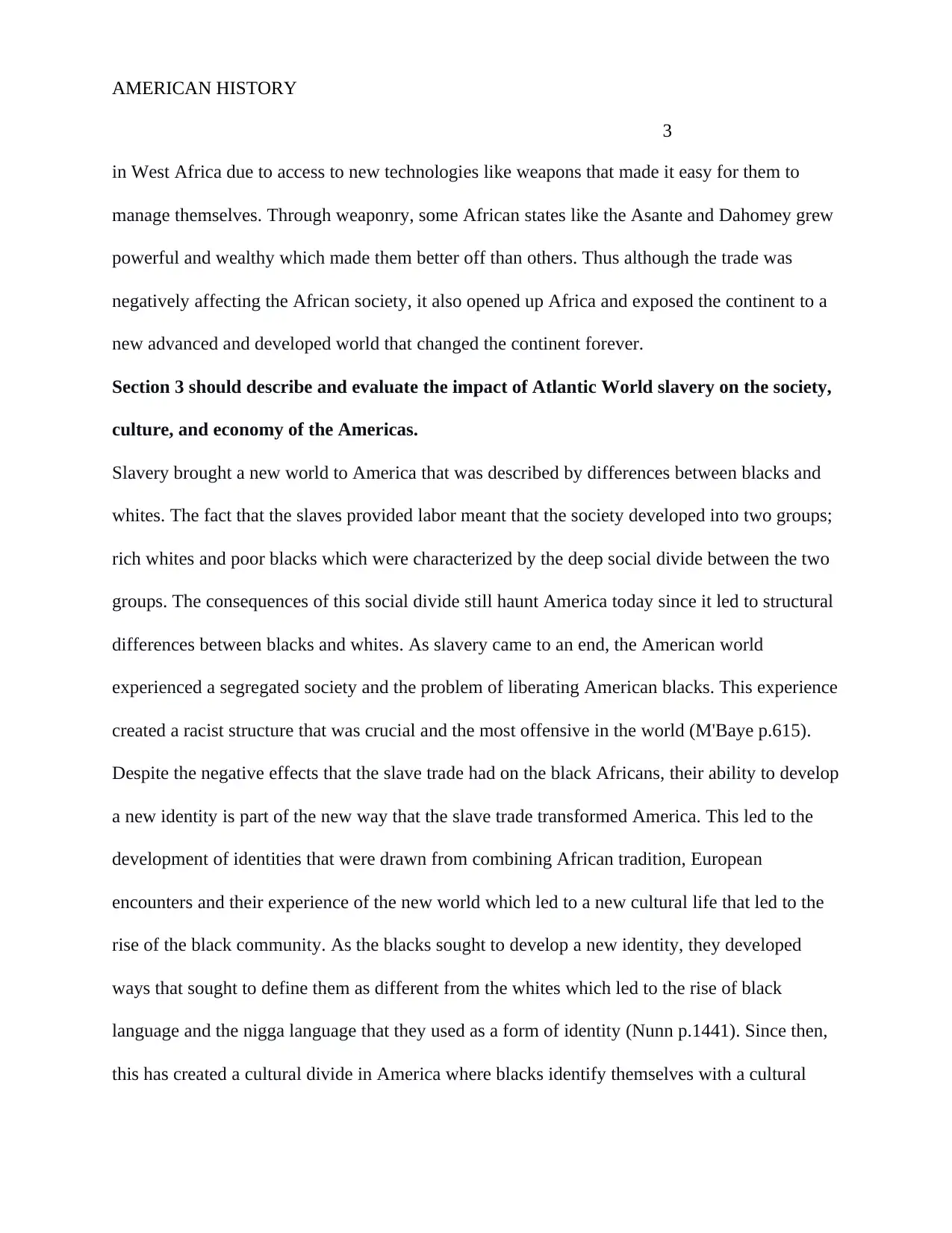
AMERICAN HISTORY
3
in West Africa due to access to new technologies like weapons that made it easy for them to
manage themselves. Through weaponry, some African states like the Asante and Dahomey grew
powerful and wealthy which made them better off than others. Thus although the trade was
negatively affecting the African society, it also opened up Africa and exposed the continent to a
new advanced and developed world that changed the continent forever.
Section 3 should describe and evaluate the impact of Atlantic World slavery on the society,
culture, and economy of the Americas.
Slavery brought a new world to America that was described by differences between blacks and
whites. The fact that the slaves provided labor meant that the society developed into two groups;
rich whites and poor blacks which were characterized by the deep social divide between the two
groups. The consequences of this social divide still haunt America today since it led to structural
differences between blacks and whites. As slavery came to an end, the American world
experienced a segregated society and the problem of liberating American blacks. This experience
created a racist structure that was crucial and the most offensive in the world (M'Baye p.615).
Despite the negative effects that the slave trade had on the black Africans, their ability to develop
a new identity is part of the new way that the slave trade transformed America. This led to the
development of identities that were drawn from combining African tradition, European
encounters and their experience of the new world which led to a new cultural life that led to the
rise of the black community. As the blacks sought to develop a new identity, they developed
ways that sought to define them as different from the whites which led to the rise of black
language and the nigga language that they used as a form of identity (Nunn p.1441). Since then,
this has created a cultural divide in America where blacks identify themselves with a cultural
3
in West Africa due to access to new technologies like weapons that made it easy for them to
manage themselves. Through weaponry, some African states like the Asante and Dahomey grew
powerful and wealthy which made them better off than others. Thus although the trade was
negatively affecting the African society, it also opened up Africa and exposed the continent to a
new advanced and developed world that changed the continent forever.
Section 3 should describe and evaluate the impact of Atlantic World slavery on the society,
culture, and economy of the Americas.
Slavery brought a new world to America that was described by differences between blacks and
whites. The fact that the slaves provided labor meant that the society developed into two groups;
rich whites and poor blacks which were characterized by the deep social divide between the two
groups. The consequences of this social divide still haunt America today since it led to structural
differences between blacks and whites. As slavery came to an end, the American world
experienced a segregated society and the problem of liberating American blacks. This experience
created a racist structure that was crucial and the most offensive in the world (M'Baye p.615).
Despite the negative effects that the slave trade had on the black Africans, their ability to develop
a new identity is part of the new way that the slave trade transformed America. This led to the
development of identities that were drawn from combining African tradition, European
encounters and their experience of the new world which led to a new cultural life that led to the
rise of the black community. As the blacks sought to develop a new identity, they developed
ways that sought to define them as different from the whites which led to the rise of black
language and the nigga language that they used as a form of identity (Nunn p.1441). Since then,
this has created a cultural divide in America where blacks identify themselves with a cultural
⊘ This is a preview!⊘
Do you want full access?
Subscribe today to unlock all pages.

Trusted by 1+ million students worldwide
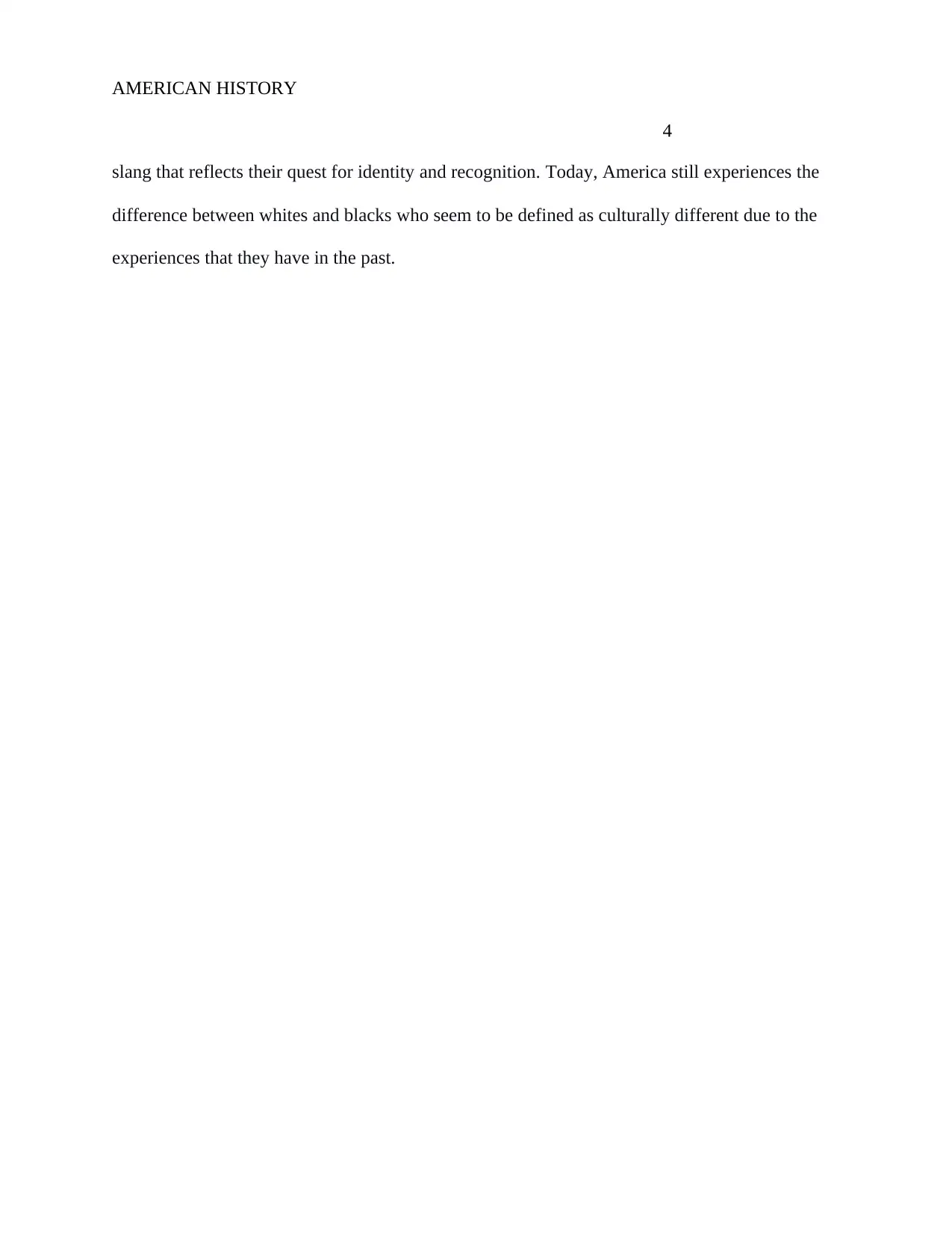
AMERICAN HISTORY
4
slang that reflects their quest for identity and recognition. Today, America still experiences the
difference between whites and blacks who seem to be defined as culturally different due to the
experiences that they have in the past.
4
slang that reflects their quest for identity and recognition. Today, America still experiences the
difference between whites and blacks who seem to be defined as culturally different due to the
experiences that they have in the past.
Paraphrase This Document
Need a fresh take? Get an instant paraphrase of this document with our AI Paraphraser
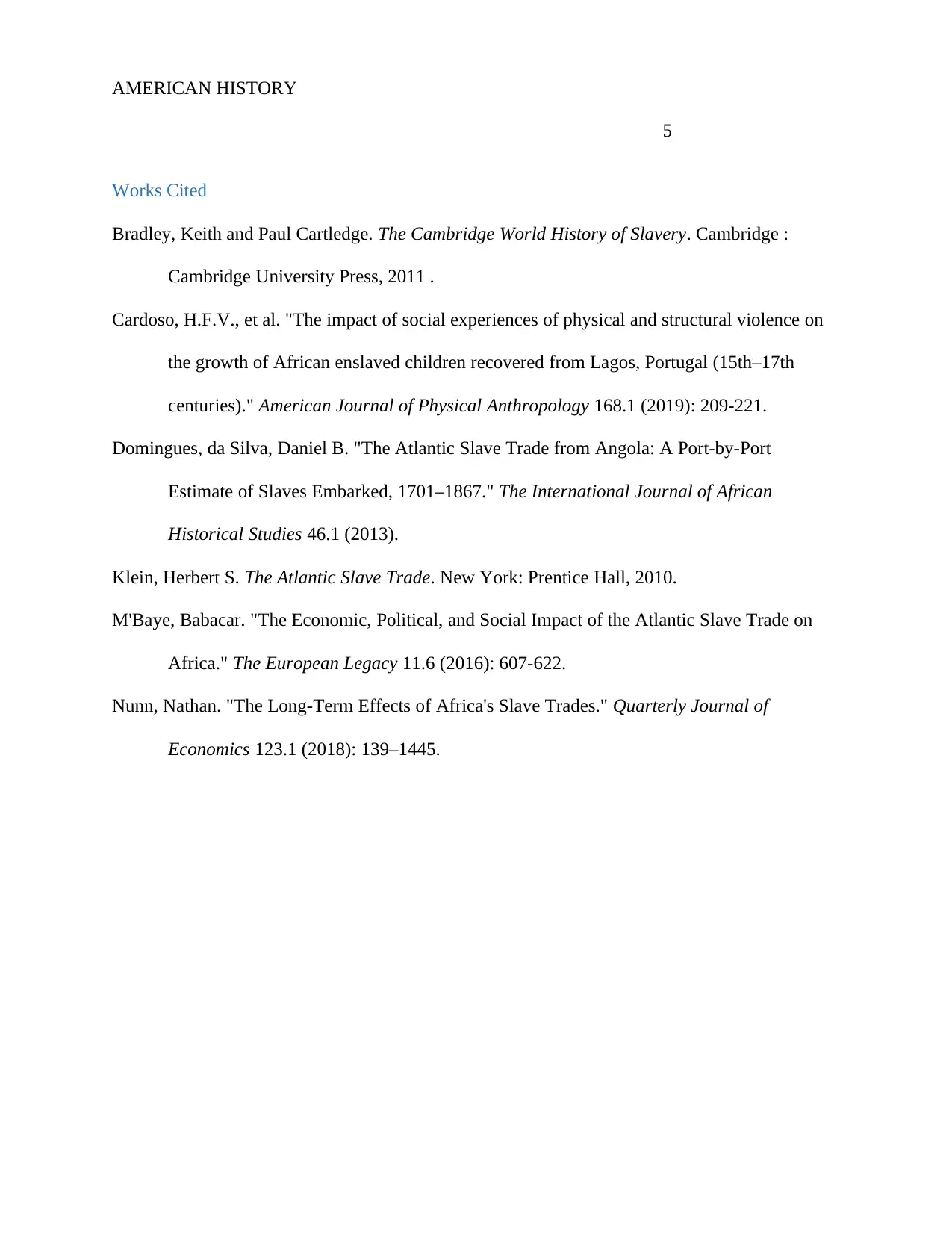
AMERICAN HISTORY
5
Works Cited
Bradley, Keith and Paul Cartledge. The Cambridge World History of Slavery. Cambridge :
Cambridge University Press, 2011 .
Cardoso, H.F.V., et al. "The impact of social experiences of physical and structural violence on
the growth of African enslaved children recovered from Lagos, Portugal (15th–17th
centuries)." American Journal of Physical Anthropology 168.1 (2019): 209-221.
Domingues, da Silva, Daniel B. "The Atlantic Slave Trade from Angola: A Port-by-Port
Estimate of Slaves Embarked, 1701–1867." The International Journal of African
Historical Studies 46.1 (2013).
Klein, Herbert S. The Atlantic Slave Trade. New York: Prentice Hall, 2010.
M'Baye, Babacar. "The Economic, Political, and Social Impact of the Atlantic Slave Trade on
Africa." The European Legacy 11.6 (2016): 607-622.
Nunn, Nathan. "The Long-Term Effects of Africa's Slave Trades." Quarterly Journal of
Economics 123.1 (2018): 139–1445.
5
Works Cited
Bradley, Keith and Paul Cartledge. The Cambridge World History of Slavery. Cambridge :
Cambridge University Press, 2011 .
Cardoso, H.F.V., et al. "The impact of social experiences of physical and structural violence on
the growth of African enslaved children recovered from Lagos, Portugal (15th–17th
centuries)." American Journal of Physical Anthropology 168.1 (2019): 209-221.
Domingues, da Silva, Daniel B. "The Atlantic Slave Trade from Angola: A Port-by-Port
Estimate of Slaves Embarked, 1701–1867." The International Journal of African
Historical Studies 46.1 (2013).
Klein, Herbert S. The Atlantic Slave Trade. New York: Prentice Hall, 2010.
M'Baye, Babacar. "The Economic, Political, and Social Impact of the Atlantic Slave Trade on
Africa." The European Legacy 11.6 (2016): 607-622.
Nunn, Nathan. "The Long-Term Effects of Africa's Slave Trades." Quarterly Journal of
Economics 123.1 (2018): 139–1445.
1 out of 5
Related Documents
Your All-in-One AI-Powered Toolkit for Academic Success.
+13062052269
info@desklib.com
Available 24*7 on WhatsApp / Email
![[object Object]](/_next/static/media/star-bottom.7253800d.svg)
Unlock your academic potential
Copyright © 2020–2026 A2Z Services. All Rights Reserved. Developed and managed by ZUCOL.





